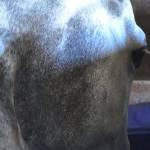Enzyme Supplements for Horses

Enzymes play important roles in physiology, including neurotransmitter function, energy production, and digestion, through the acceleration of chemical reactions. In the process of digestion, enzymes help break down feed so that nutrients can be readily absorbed. A recent trend in human nutrition has been to supplement digestive enzymes in an effort to improve digestion and ease gastrointestinal upset. But, do such supplements work in horses?
Enzymes Are Naturally Present
Digestive enzymes help make nutrients available to horses. Some examples of enzymes produced in the horse’s body include:
- Pepsin – secreted in the stomach to break down proteins
- Lipase – secreted by the stomach and pancreas to break down fat
- Amylase – secreted by the pancreas into the small intestine to break down carbohydrates
- Protease – breaks down proteins to free amino acids
- Lactase – found in the small intestine; breaks down lactose, or milk sugar, and virtually disappears by 4 years of age.
Supplemental Enzymes
One enzyme known as phytase is not produced by mammals, but it is necessary to liberate much of the natural phosphorus found in grains, grain byproducts, and oilseeds. Phytase is often supplemented to ruminants and poultry in order to make more phosphorus available from feedstuffs it otherwise wouldn’t be. This decreases the need to add excess phosphorus to the diet, potentially lessening excretion and the subsequent negative environmental impact. While data is limited, research has shown that supplemental phytase is of no benefit to horses, and that the microbial population in the hindgut does a sufficient job of liberating phosphorus in feedstuffs.
The enzyme cellulase breaks down fiber. Cellulase has been successful in improving fiber digestibility in ruminants, such as dairy cows. While useful in ruminants, it has not been proven to increase fiber digestion in horses.
Other enzymes that are sometimes added to livestock feeds or supplements include protease, lipase, and hemicellulase. These have not been studied in horses, and there is no scientific evidence of improved feed digestibility as a result of supplementing these enzymes.
Summary
Supplemental enzymes do not appear to enhance the horse’s ability to digest food beyond what occurs naturally. The microbial population in the hindgut is well suited to digest fiber without supplementation. While additional research is needed to more fully understand the effects of supplemental enzymes, the existing evidence suggests that the machinations of a healthy horse’s digestive system are sufficient to break down feed and absorb nutrients all on his own.
Certain horses have problems with hindgut health due to inconsistent microbial populations brought about by diets that are high in grain or sugar-rich forages. For these horses, EquiShure provides hindgut support in the form of a time-released buffer.








